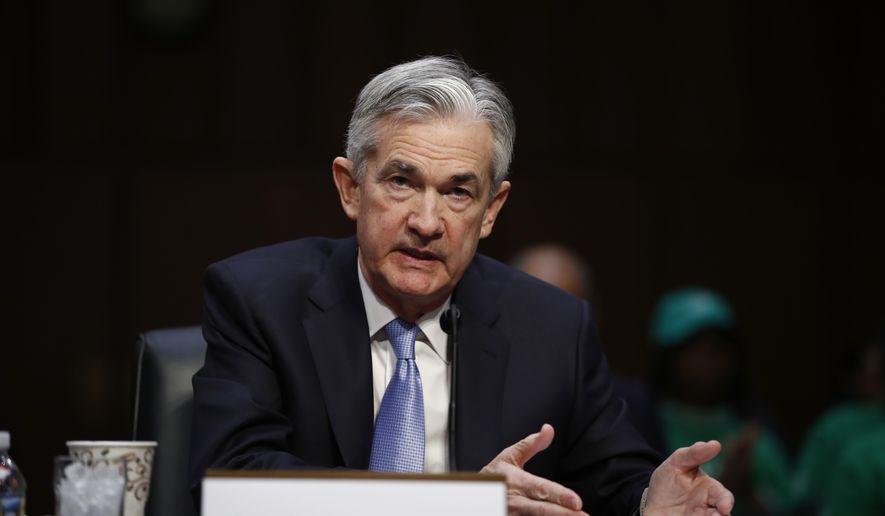President Trump’s pick to head the Federal Reserve set a steady-as-she goes course for the nation’s central bank and said he does not believe there are any U.S. financial institutions whose collapse would pose a systemic risk to the economy.
In a confirmation hearing before the Senate Banking Committee, Jerome Powell, a governor on the Federal Reserve Board since 2012, offered no big plans for a shake-up at the Fed, predicting interest rates will likely continue a slow climb as the central bank winds down a huge balance sheet built up fighting the Great Recession of 2008. He also deftly sidestepped efforts by Republicans and Democrats at the Senate Banking Committee confirmation hearing to recruit him into the fierce partisan debate over President Trump’s proposed tax cuts.
But Mr. Powell also hinted at an unexpected dovish side on the Fed’s role in boosting employment, suggesting there may still be slack in the U.S. labor market despite an official jobless rate of 4.1 percent, the lowest in 17 years. The central bank “can push harder” to get the rate even lower, he said.
Asked by Louisiana Republican Sen. John Kennedy if there were any “too-big-to-fail” banks in the United States, Mr. Powell replied, “No, I don’t think there are.”
Fears about the collapse of a giant lender — and the ripple effects that would have across the financial sector — were a major focus of regulation in the wake of 2008 global financial crisis, but many banks chafed at the tougher oversight and monitoring they faced. Pressed by Sen. Elizabeth Warren, Massachusetts Democrat, on whether banking regulation could be toughened in some areas, Mr. Powell said he would generally look instead for ways to ease the regulatory burden.
The markets appeared to welcome Mr. Powell’s performance, along with progress on the GOP tax bill in the Senate, with both the Dow Jones Index and the broader S&P 500 surging to new records on Wall Street. Bank stocks were some of the day’s biggest gainers.
The nominee came as close as a Fed governor will come to tipping off a coming rate hike, saying a long-signaled quarter-point increase is likely when the board meets next month.
“The case for raising interest rates at our next meeting is coming together,” he told lawmakers, while cautioning no final decision has been made. “I think the conditions are supportive of doing that.”
Mr. Powell, a lawyer and investment banker who served in the Treasury Department under President George H.W. Bush, was nominated to be America’s next central banker after President Trump decided not to offer current Chair Janet Yellen a second four-year term in the job.
The Fed chair nominee has generally backed Mrs. Yellen’s monetary policies designed to spur the economy through record-low interest rates. He told the Senate panel Tuesday he is committed to an independent Fed and neither Mr. Trump nor his aides have tried to pressure him on monetary policy.
The tax cut fight was intensifying even as Mr. Powell was testifying, as Mr. Trump traveled to the Capitol to lobby wavering Senate Republicans to support the measure. Although committee Democrats repeatedly invited the nominee to comment on projections the tax bill could send deficits higher, Mr. Powell said the Fed’s focus under his chairmanship would remain stable prices and full employment.
“Respectfully, I don’t think [Congress] relies on us to score fiscal proposals,” he said.
“He hit it right down middle of the fairway,” Mark Zandi, chief economist at Moody’s Analytics, told CNBC. “It’s very consistent with the Yellen Fed. … It’s status quo and investors took solace in that.”
Michael Pearce, U.S. economist at Capital Economics, in a note to clients, said that the nominee’s “closely guarded” testimony “contained few signs that he will bring any new thinking or change of approach” to the Fed, and predicted a continuing series of modest interest rate increases through 2018.
The 64-year-old Mr. Powell, a native Washingtonian, is expected to be easily confirmed by the Senate to take over as Fed chairman when Mrs. Yellen’s term expires in February.
• David R. Sands can be reached at dsands@washingtontimes.com.




Please read our comment policy before commenting.